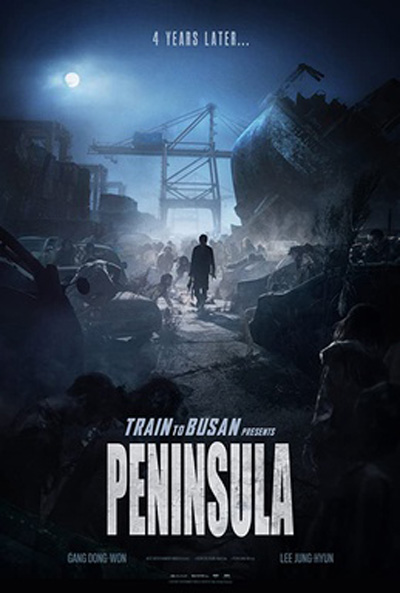Mladen and Del review ‘The Block Island Sound’

Image courtesy of Netflix.
“The Block Island Sound” Starring Chris Sheffield, Michaela McManus, Matilda Lawler, Neville Archambault, and others. Directed by Kevin McManus and Matthew McManus. 99 minutes. Unrated. Netflix.
Mladen’s take
Del warned me to avoid spoilers when I recapitulate the plot of “The Block Island Sound” because the film relies on keeping the source of the troubles endured by our protagonists secret.
So, here are a couple of sayings to help you meander through this review while I try to explain what the sci-fi-like, horror-ish “The Block Island Sound” is about without giving away the neat ending. To appreciate the ending, by the way, be sure to pay attention to the beginning of the movie. It’s the scene between mother and daughter talking about studying animals.
I’m borrowing the first indirect explanation of “The Block Island Sound” storyline from a couple of Star Trek movies: “The needs of the many outweigh the needs of the few.” I believe that’s a Spockism.
Then there’s “What’s good for the goose is good for the gander.” I have no idea where that saying originated.
The movie also portrays and warns about doing onto others, in this case marine fish, what you wouldn’t want done unto you. That truism is derived from the Bible or some other piece of historical fiction.
“The Block Island Sound” is a slo-mo film that constantly has the viewer wondering what the hell is going on. By slo-mo I mean action is limited and the story unfolds through the tension of a family that doesn’t get along. There are a couple of drunkards, the father and the son; a smart and altruistic sister and her cute daughter; an unempathetic and punitive sister; and a dead mother.
Other characters in the film are the gossip and law enforcement attitudes of a small, somewhat isolated community. A kook expounding all sorts of conspiracies about the Government, parasites, and I can’t recall what else is in the movie, too.
Semi-mass dyings of fish and birds and an apparition are also parts of the story.
“The Block Island Sound” takes place in the American Northeast, somewhere in the vicinity of Nantucket. The sea is blue-gray, as is the sky. The movie’s moodiness is similar to “The Vast of Night” or “Cosmos.”
The acting is good, even if the smart sister seems to be dumb occasionally though she’s a scientist. Chris Sheffield, playing emotionally tortured Harry, executes again and again some one of the finest examples of walking catatonia, the vacant stare and slackened face, the blank expression, a hypnotic state, describe it as you wish, I’ve seen in a movie.
Be patient watching “The Block Island Sound.” Everything is tied together at the end in pretty cool fashion. Disregard, to some degree, the family dysfunction that’s regurgitated throughout the film. It annoyed me, but I hung on until the credits rolled to see what caused the strangeness on the island and its local waters.
“The Block Island Sound” earns a B, just scraping past a B-, from me.

Del’s take
I won’t be as charitable as Mladen in grading “The Block Island Sound.” The movie was a tad schizophrenic for my tastes.
To amplify Mladen’s plot summary, the story is about a man caring for his Alzheimer’s-stricken father at the ancestral home on an island somewhere in the Northeast. His sister, who works for the Environmental Protection Agency, returns to the island with her daughter to study a series of bird and fish kills. When the father turns up missing and then deceased, another daughter, the bitchier of the two sisters, joins her siblings for the funeral. The brother resents his sisters for abandoning him to the care of their father. And now he’s seeing things. He’s drinking heavily. He’s falling apart.
For the most part the movie is competently made, and casting and script are fine (faint praise). My gripe is with the metastory. There are two stories at work here, and the McManus brothers do a much better job of telling one. The second story is not original in content or presentation.
Most interesting is the interaction between the siblings, all finely drawn by the actors. Sheffield does a good job as Harry, the suffering son who has remained behind to take care of his dementia-addled father while his two sisters pursue their lives unencumbered by familial obligations. McManus and Heidi Niedermeyer are equally effective as the two sisters who have left their ailing father in the hands of their brother, then snottily fault him for crumbling under the pressure of caregiving. The interplay between these three is sufficiently interesting to compel a watch, despite the fact that none of them is very likeable.
And the second story? It emerges slowly over the course of the action, until sometime in the second act when the climax is telegraphed, resulting in an anti-climax to wrap that branch of the narrative and the movie itself.
As many character studies go, the pacing of “The Block Island Sound” is slow, abetted by a depressing color palette of grays and steely blues, always cloudy skies, and a choppy Atlantic Ocean that does not give up its secrets. Likewise the tone is dark and funereal. You are watching the dissolution of a family as much as a mystery about dying fish and crows flying into windshields.
My sense is the overarching thematic imperative is one of loss – loss of soul due to the escalating infirmity of cognitive decline, loss of life on the part of those in the caregiver role, loss of empathy for those who have shirked their responsibilities and in the end, loss of humanity.
That’s a lot to digest in a movie that’s pitched in its trailer as being about something more congruent with a horror movie. Who wants to be entertained by grim reality when there’s a fun universe of exploding heads to be explored?
If the McManus brothers had left out the fish kills, bird kills and all the nonsense that followed, “The Block Island Sound” would have earned a B+ from me. As it is, the movie gets a C.
Mladen Rudman is a former journalist and technical writer. Del Stone Jr. is a former journalist and author.

Image courtesy of Next Entertainment World.
“Train to Busan Presents: Peninsula.” Starring Lee Jung-hyun, Dong-won Gang, Re Lee, Ye-won Lee, Hae-hyo Kwon, Kyo-hwan Koo, and others. Directed by Sang-ho Yeon. 115 minutes. Rated PG-13. Amazon pay-to-stream
Mladen’s take
There I sat, wavering. It was about three-fifths of the way through the South Korean movie “Train to Busan Presents: Peninsula.” My qualms included a meditation on the film’s weird title, which was clearly an example of success exploitation marketing. Was this semi-sequel to the excellent film “Train to Busan” worthy of a good grade or does it deserve a bad grade? And, then, came the straight-faced line: “Let’s get Mom.” Poof, I dropped into the “Better than Average” column, but only just.
Before I sum the plot, you’re owed a warning. Del the zombie-phile will praise this movie, maybe even slip it an A-. He’ll be wrong. The movie is one full grade lower, but worth watching. It cost me 55 cents to lease a 48-hour viewing window on Amazon.
Recall that “Train to Busan” introduced us to some very good action horror with an unremarkable plot very well executed. A bioengineering laboratory accidentally releases a contagion that transforms people into something akin to the rampaging quasi-dead hungry we first met in 2010’s “28 Hours Later.” In “T to B,” the story was driven by a father trying to keep his daughter alive, if I recall accurately, as the infected multiply and the state rapidly loses control of law and order. “T to B” possessed stunning special effects. The locomotive slowly motoring along while zombies clinging to the back of the machine pile on each other to make a squirming, yet flowing tail of organic debris was something else.
That “something else” was missing in “Peninsula.” The computer-generated special effects lacked believable physics of motion. The vehicles bulldozing through zombies, jumping roads, or smashing into each other seemed like Matchbox cars running the gauntlet of a plastic race course. Also, at times, “Peninsula” seemed very “Casshern”-like or “Alita: Battle Angel”-ish. The difference is that “Casshern,” a 2004 Japanese movie, and “Alita” of 2019 intentionally deployed the tinge of anime as part of the storytelling. “Peninsula,” which imagined quarantined South Korea four years after the “T to B” virus was unleashed, often portrayed dilapidated urban terrain or action scenes with the patina of a video game that had mated with anime to create an almost-cartoon. In short, the visual effects in “Peninsula” were surprisingly crappy.
Oh, the plot. A South Korean soldier loses his sister and nephew to zombie-itis, but manages to save his brother-in-law. A few years later, the pair gets sucked into returning to South Korea to retrieve a truck load of American dollars for an American gangster based in Hong Kong. If they and a couple of others succeed, they get half of $20 mil. That’s money that would get them out of the political limbo of being microbe-induced refugees. Naturally, the return to the Peninsula, get it, goes astray. Dong-won Gang, playing South Korea Army Capt. Jung Seok, gets pulled off a zombie dinner plate by feisty, hard-driving teenager Jooni, played by Re Lee, and her younger sister Ye-won Lee as Yu Jin. They flee to their hideout, where Jung meets resourceful, determined, and very pretty Min Jung. Min is played by Lee Jung-hyun. She’s the mom in “Let’s get Mom.” While Jung, Min, and the girls are good and likeable characters in the film, most of the bad guys are all pretty much clichés and fail to be unlikeable. The exception was Captain Seo, nicely portrayed by Kyo-hwan Koo as desperate and scheming to the end. He has no trouble shooting the old man and Mom to get the hell off the Peninsula.
The soundtrack in the film is good enough. There was a moment when I thought I heard a few stanzas, verses, whatever you call pieces of music, that sounded like an adventure tune in the video game “Halo.”
OK, Del, take it away with your take. Please don’t let the blubbery family scenes in “Peninsula” color your judgment as they did when you watched the last film we reviewed. We owe it to our growing readership to assess correctly the merits of a film.

Del’s take
It was I who recommended to Mladen that we review “Peninsula.” It was not I who recommended that he tap the cooking sherry before writing his review.
He’s correct when he describes the putative prequel to “Peninsula,” “Train to Busan” as excellent. I remember foraging through Netflix one night, searching for something to watch, when I stumbled across “T to B.” Another hokey foreign zombie flick, I warned myself, before clicking the “play” button. Imagine my surprise when I discovered a modern classic in science fiction-horror, one I’ve added to my DVD collection. “T to B” is that good. I would rate it up there with the Zack Snyder remake of “Dawn of the Dead.”
So it was with great expectations that I forked over my 99 cents to watch “Peninsula.” (I’d like to know how Mladen managed to do that for 55 cents. Did he get the cooking sherry discount?)
To put it succinctly, I was not impressed. For these reasons:
1. It’s derivative. Take the premise of “28 Weeks Later,” throw in some “Escape from New York” and using crude, Frankensteined stitches graft on any road chase sequence from the “Mad Max” movies and you’ve got “Peninsula.”
2. Mladen was right about another aspect of the film – the special effects. They weren’t just bad. They were cartoonish, on par with “Speed Racer.” They completely ruined the movie for me because I’ve seen car chases and motorized mayhem done right – all that metal-crunching comprises a story of its own. You want a car chase? Consult George Miller. You don’t hand it to the CGI folks, and that’s what the creators did with “Peninsula.” Those scenes screamed “Fake!” and threw me out of the zombie-infested universe Sang-ho Yeon sought to create.
3. Many of the major characters were unlikable. As Mladen explained, the point of this group’s return to zombie-infested South Korea is to recover a truckload of American dollars. The deal is a small group will find the truck and drive it back to an Inchon dock, where it will be loaded aboard a ferry. The group gets half the $20 million and the crooks get the other half. Ahem. Of course. The crooks will most definitely abide by their end of the deal. Have you never heard of honor among thieves?
The movie is really about Gang Dong-won’s character attempting to redeem himself after refusing to help a family in need during the initial, hyper-frantic days of the zombie outbreak. As subtexts go it’s about as subtle as a Mar-a-Lago powder room and Jung-seok is such a weak and altruistic tormented-soul type that by mid-movie you’re hoping one of his putrid antagonists makes a snack of him.
4. Nitpicks. Why does a director spend a considerable chunk of screen time building tension and setting a deadline, and when that deadline arrives the director allows his characters to engage in long, deadline-busting soliloquies and dénouements?
How is it that a car will start after sitting idle four years?
Why are children always precocious and infallible?
Why are the elderly characters always expendable?
Why does a highway choked with wrecked and abandoned vehicles always have a lane open?
Why was South Korea simply abandoned? Is its net worth beneath the scope of recovery?
5. The version I saw was not subtitled. It was dubbed. Have I ever told you how much I hate dubbing? When you can see the character’s mouth moving while the dialogue track stopped three seconds ago?
Enough fussing. Bottom line: I was hoping for a movie that matched the off-the-rail entertainment punch of “Train to Busan” and what I got for my 99 cents (Really, Mladen? Fifty-five cents?) was something altogether different and, dare I say, less everything. I could wax all movie-review poetic and talk about the film’s emotional core or its resonance to the genre template but this is not a thirst trap for pretty words. Suffice it to say “Peninsula” was a disappointment.
For much better fare about the undead try “Cargo” or the unbelievably good series “Black Summer,” both on Netflix at no extra charge. For an even weirder take on the zombie genre try Arnold Schwarzenegger in “Maggie,” which you can find in some DVD bargain bins.
“Peninsula” gets a grade of C from me.
Mladen Rudman is a former journalist and technical writer. Del Stone Jr. is a former journalist and author.

Image courtesy of Netflix.
“Project Power” Starring Jamie Foxx, Joseph Gordon-Levitt, Dominique Fishback, and others. Directed by Henry Joost and Ariel Schulman, 113 minutes. Rated R. Netflix.
Mladen’s take
I watched “Project Power” a couple of weeks ago and, because the film isn’t worth re-watching, I’m writing this review from memory. Don’t misunderstand, cantankerous Del. “Project Power” is fine for a one-time seeing. Its plot is decent. The acting is good. Visual effects are good. I appreciate the effort the directors made to convey some of the movie from an artsy perspective like the basement room brawl and shootout. Hell, there was one scene toward the end of the film that made me chuckle, though it was a take on the old, “No, your other left.” And, I don’t care that one of our protagonists melodramatized the strength of the strike of a mantis shrimp. Or, was it the pistol shrimp? Or, are they the same species of Odontodactylus?
In “Project Power,” a rogue defense contractor/pharmaceuticals company disallowed to trials test a powerful physiology-altering drug that either kills you or infuses you with a unique power starts selling it as street smack. To gather lessons learned, collect proof of its discovery’s potential to the rich and connected assholes of the world, and elude mainstream press coverage, the pharma moves from city to city using pre-screened drug dealers to push its wares. Where pharma’s potion draws coverage, it’s snippets reported by the local media. One such unbelievable story was the claim that a suspect outran a police car on foot. Toss in a father’s (portrayed by Jamie Foxx) search for his kidnapped daughter, a smart young woman’s (portrayed by Dominique Fishback) need to raise money to help her mother with medical bills, and a New Orleans cop’s (portrayed by Joseph Gordon-Levitt) urge to protect his city and “Project Power” becomes a movie with too many anecdotal, though tolerable, moments.
The principal trouble with “Project Power” is its blunt-force-trauma wokeness. Blending so forcibly and pedantically the prejudices faced by blacks into a sci-fi thriller, paradoxically, weakened the message all of us non-Trumpers, anti-McConnells, and Baby Gaetz-Jerkoff Jordan-Supplicant Nunnes haters want reinforced. Racism and lack of economic opportunity for blacks is disgraceful, immoral, and illegal, but you have to be careful about whining because it’ll trigger those among us who’ll happily respond to Black Lives Matter by flippantly saying all lives matter as though there’s no history of, oh, slavery and Jim Crow in this country. In “Project Power,” unfortunately, the wokeness takes the tone of a dry, set-piece lecture.
One of the film’s strongest points is the clever and authentic way it melded the story of “Henrietta” into its script. From the ACLU website: “In 1951, doctors harvested cells from Henrietta Lacks while she was receiving treatment for cervical cancer and discovered that her cells had an amazing capacity to reproduce. ‘The Immortal Life of Henrietta Lacks,’ which aired … on HBO and is based on the book of the same name, tells the dramatic story of how scientists used the ‘HeLa’ cells in research for decades without the knowledge of her family.” As it turns out, Foxx’s character in “Project Power” is chasing pharma because it kidnapped his daughter to study and weaponize her superpower to heal. Neat.
Fishback, who plays Robin in the film, is very good. She does a wonderful job creating her character, a spunky and smart high schooler caught in an untenable dilemma. To help her mother buy health care, Robin pushes pharma’s power pill to drug users. Foxx as Art goes smoothly from appearing to be a bad guy to showing himself as the good guy, after all. Frank, Gordon-Levitt’s role, is a smart-aleck cop who pops a power pill to don his special attribute, very tough skin and/or bones that can absorb a 9-mm round to the temple from pointblank range with only bruising. He just wants to save New Orleans from itself and grifters with links, if I recall correctly, to the federal government. That subplot got a little blurry for my aging brain. Wonder if there’s a pill for lapsing mental acuity?
“Project Power” is sprayed with violence, car chases, and such. All of it good. The CGI approached to top-notch, barring the flaming dude at the beginning of the movie. He looked like he was engulfed by flaming paper streamers or one of those eerie two-story-tall inflatable marketing tubes that bop and wave at you as you drive by. I can’t remember the score, suggesting it was unnoteworthy.
Shit, I don’t know. Maybe “Project Power” is worth a second viewing. I’ll think about it. You, meanwhile, feel free to enjoy this solid B of a movie for its fairly common sequences of good moviemaking. Del, how about you getting off your ass to see this film, so that we can satisfy our loving readers with yet another good review by me and whatever it is that you slap together?

Del’s take
Yes, Mladen, there is a pill for lapsing mental acuity. It’s called Prevagen and I gave you a bulk gift basket from Sam’s Club for Christmas last year. Or have you forgotten?
I watched “Project Power” because Netflix flogged it as “No. 1 in America,” the trailer had cool special effects and it starred Joseph Gordon-Levitt, of whom I am a big fan. I know. Those are judgments based on the book cover principle. But let’s not be coy: We all judge books by their covers, regardless of aphorisms and scolding admonitions. The “Project Power” looked cool.
I thought it was an OK movie. Not great; not terrible. An acceptable use of almost two hours of my entertainment ration. Gordon-Levitt and Foxx are excellent. Dominique Fishback is exceptional. The special effects were terrific and the script was airtight. Plus it was nice to see New Orleans as the setting; I’ve been there many times and it is a unique city, unlike any other in the country. In some ways it reminds me of Spain (a tactic urban planners could adopt for future American developments – cultural design).
I didn’t have as much a problem with the “wokeness” as Mladen put it, though I would agree the delivery of that important message was clumsy and heavy-handed. It leaned more toward telling, not showing, a cardinal sin for all storytellers.
My big problem with “Project Power” was this: They took a big idea and married it to a small story.
Imagine being able to take a pill that would give you a superpower for five minutes. Imagine the potential, not just for warfare but crime, sports, law enforcement, even entertainment? Imagine such a capability in the hands of a rogue player – North Korea, or a school shooter? With this technology you have the ability to completely revolutionize society, and in the process tell a big, world-spanning story. Instead, “Project Wastes” it on drug deals and a man trying to find his daughter. It’s like discovering a cure for cancer and using it to clear up those unsightly liver spots on your hands.
Also, was I mistaken or did the movie suggest taking this drug exacted a physical toll from the user? Because some of the folks looked a little worse for wear following their excursions into the world of superpowers. I don’t believe that aspect of the story was explored to any depth.
Believe it or not, Mladen, I agree with your grade of B for “Project Power.” It has big ambitions but wastes them on a small story that, in the end, doesn’t really change anything.
If you’re looking to invest two hours of movie-watching time in a gritty, science-fictiony universe, catch “Project Power” on Netflix. But unlike its magic pill, your mind will not have been expanded after the experience.
Mladen Rudman is a former journalist and technical writer. Del Stone Jr. is a former journalist and author.

Image courtesy of Warner Bros.
“Tenet” Starring John David Washington, Robert Pattinson, Elizabeth Debicki, Aaron Taylor-Johnson, Kenneth Branagh, and others. Directed by Christopher Nolan. 150 minutes. PG-13. Pay-per-view on YouTube, Google Play, Amazon Prime, Vudu, DVD.
Del’s take
In my dodderage I’ve become less enamored of puzzle boxes, Russian dolls, hidden meanings, subtext within subtext, Rubik’s cubes and other gimmicks, tricks, deflections and distractions – anything capable of making me believe something that isn’t true. We live in an age Qanon, ignorance on an industrial scale, conspiracy theories, corporate subterfuge and red hat-wearing politicians who not only lie shamelessly but revel in their malevolent deceit. Is it asking too much of a movie to just be a freaking movie and entertain me for a couple of hours instead of making me do a bunch of work?
I spent $15.99 on the “Tenet” DVD and I really, really wish I could get that money back. “Tenet” is well made and several of the performances are excellent, but it’s unwatchably dense and about as warm as a guest at the county morgue.
I can’t effectively summarize the plot because I’m still not sure I understand it. John David Washington is a CIA agent who, after an attack at a Russian opera performance, is recruited into an effort called “Tenet.” (Did I mention none of the characters have names?) Tenet is a war between us and the future. We have doomed the future with climate change, and the future is not happy about it. Future scientists have invented a way to “invert” the entropy of people and objects, allowing them to travel backward in time. Instead of using this inversion nonsense to head off climate change, the future would track down a cache of plutonium pilfered from a Russian ICBM … for what purpose? We don’t know. Is plutonium what they’re really looking for? We don’t know. What’s this about “The Algorithm” – has Facebook also pissed off the future, or is The Algorithm some kind of world-ending secret weapon invented by a future scientist and hidden in the past? Well, we don’t know, but since they bring it up. …
It’s a migraine-inducing onion of riddles hidden within paradoxes layered with feints and false flags, and to be honest I found it exhausting and unrewarding.
What’s good about “Tenet” is the cinematography, the locations, costumes, and some of the performances. Washington is excellent as the CIA agent and in my book would make a fine replacement for Daniel Craig when all those catalogs for Medicare start showing up in his mailbox. Also excellent were Robert Pattinson as Washington’s sort-of partner and Elizabeth Debicki as the suffering wife of a wicked Russian oligarch who may or may not be trying to acquire The Algorithm for his own demented death-bed purpose.
What I did NOT like about “Tenet” was the blink-your-eyes-and-miss-critical-plot-points narrative, the mumbled and often indecipherable dialogue, the lack of any pathos (which is typical of Christopher Nolan’s fare) and the unfathomable density of the plot. It seems Nolan is making movies for himself, not his audience.
After everything that has happened the past four years, my brain is only capable of processing movies like “Hobo with a Shotgun” or “The Man Who Killed Hitler and then the Bigfoot.” I would need a few less pandemics, insurrections and climate catastrophes before I could enjoy “Tenet.”
If acting and cinematography were the only criteria I could give “Tenet” an A-. But its hard-to-hear dialogue, lack of an emotional heart and black-hole density bring that grade down to a B. If you’re up for doing the work Nolan seems to ask of his fans, knock yourself out. I wasn’t.

Mladen’s take
Alas, I share Del’s frustration with “Tenet.” Despite his dodderage and, believe me, it’s advanced, he’s correct about the film. “Tenet” is a mess in execution.
Actually, I’m more frustrated than Del because I disliked the suffering wife/doting mother character played by Elizabeth Debicki. She damn near caused the destruction of 7 billion people in our time because she didn’t want her one son to be traumatized by, oh, hell, I forgot the reason.
“Tenet” is based on a neat concept. In this nicely shot film, people are able to move backward or forward in the same space. The spacetime of “Tenet” (the word reads the same backward or forward) can be separated into space and time by scientists from the future, which, as Del notes, are waging war against the present by allying with, and supporting the martyrdom of, a Russian oligarch portrayed beautifully by Kenneth Branagh.
Demonstrating the usefulness of the capability to manipulate time – again, a neat concept – is badly mangled in “Tenet.” Particularly difficult to understand are the “temporal pincer movements” unfolding on the screen as opponents move along the time continuum in which every direction they thought would produce tactical advantage. So, for example, you have cars moving forward and backward in the same lanes. Or, you have one unit of troops starting, executing, and completing a mission and another completing, executing, and starting the same mission on the same battleground. Hell, in this film, a man can fight himself, one version of him being from the present and the other “inverted” or from where, the future? Now that I think about it, there might not be a present, past, and future in “Tenet.” In this film, time is jumbled and coils around itself, like a ball of yarn, rather than being a point-to-point, straight line event. Maybe.
The most annoying part of “Tenet” to me, for some reason, was the film insisting that an “inverted” bullet – that is, a bullet exiting your body in the same direction it had entered (I think) – would cause more damage than a bullet entering your body from the same direction it would exit. Wouldn’t a bullet reversing course and leaving your body return your body to its pre-bullet state? If the phenomenon is someone shooting you who’s inverted – while you’re what, verted? – why would there be damage at all?
I’m tempted to give “Tenet” some slack. The idea of time travelers moving in opposite directions while sharing the same space in a way that affects the outcome of the present and the future simultaneously is far out and wonderful. “Tenet” still has me thinking about time inversion, which is different, apparently, than merely time travel. “Tenet” also has some very good acting. And, I enjoyed the score. It was propulsive. My surround-sound AVR has a separate volume control for the center channel speaker, which broadcasts the dialogue in a film. I was able to listen to the words because I was able to turn-up their volume without also increasing the volume of the many explosions and much gunfire in “Tenet.” Del, I did hear the dialogue but it didn’t help me understand the movie any better.
Finally, “Tenet” was ripe for R-rated action. Yes, not showing graphically a man getting beaten to death with blows to the head using a gold bar is a terrific way of capturing violence. More is left to the imagination. But, much of the movie is loads of people shooting at each other or getting their asses mortar-ed. That would have benefitted from vivid blood splatter, heads disintegrating, and limb amputations. Making “Tenet” PG-13 was an error. This movie is not for teenagers nor will teenagers watch it. “Tenet” pushes toward cerebral. Teens ain’t interested in cerebral on the big screen. They want crude, sexual, and narcissistic, the kind of film one-term, poser president, loser Donald Trump would watch.
“Tenet” is a C because it promises top-notch sci-fi adventure and then fails to deliver.
Mladen Rudman is a former journalist and technical writer. Del Stone Jr. is a former journalist and author.